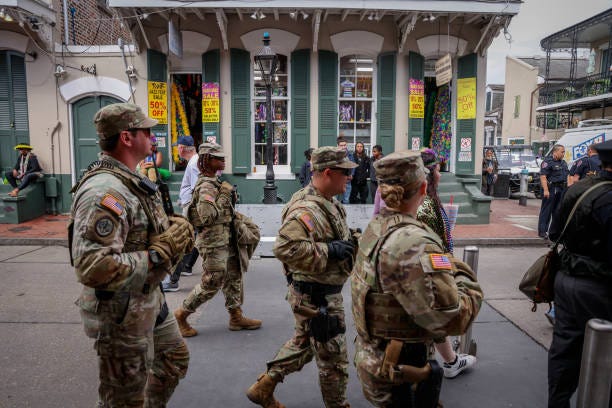
The dynamics between local, state, and federal law enforcement can be complicated. And, understandably, talk of National Guard deployment to a city might make residents uncomfortable.
However, before drawing conclusions about the statements the President made about our city, let's go over the facts.
Fact #1: From a violent crime perspective, New Orleans has already benefited from National Guard presence this year.
I spoke with both NOPD Chief Anne Kirkpatrick and President of the Metropolitan Crime Commission Rafael Goyeneche today on my show. They both agree: federal assistance wouldn’t hurt.
Let’s not fail to recognize that New Orleans has made incredibly significant strides in violent crime reduction this year. Kirkpatrick explains that compared to last year, murders are down 22%, armed robberies are down 31%, and fatal shootings are down 40%... etc.
That's incredible news, and I applaud everyone involved in that effort. However, we can’t let good be the enemy of something better than good.
Fact #2: It’s no secret the NOPD is understaffed. Kirkpatrick explains that the department has spent a lot on overtime hours so far this year, specifically related to the response to the Jan. 1st terror attack.
In short, our police force could use some backup. And President Trump—whatever your opinion of him—says he’s willing to offer just that. So, while I disagree with the President when he says that the National Guard would here would wipe out crime in two weeks, I agree that the added resource would benefit our police department.
And understanding that benefit is where most people get things mistaken. Critics will say, Who cares if Trump sends the National Guard? That just means overpolicing in the CBD and Vieux Carre; they aren’t going where we actually need more law enforcement.
With tunnel vision, you could say those folks might be right. The National Guard presence would more likely be concentrated on Poydras, Bourbon, or Jackson Square rather over in New Orleans East. But what that does is give the NOPD more flexibility to move its resources and personnel around to focus on areas that require greater oversight.
Kirkpatrick recognizes this. “We as police officers are not at war with our community," she explains. "Legally, we are defined as peace officers. But whatever the situation is, Anne Kirkpatrick is going to work with anyone and everyone as collaboratively as we can, and that's why you're seeing our crime strategies working.”
And what was that winning strategy? Accepting help from the National Guard.
Goyeneche spelled it out as clear as day: When the National Guard was here, January-March, violent crime plummeted.
“We took a look at the average weekly reported violent crime rate in the city from January through August 31st. Right after the terror attack, the reported major violent crimes were 8.6 per week. That was January through February 9th,” Goyeneche estates. “Then, from February 10th through March 9th, we averaged about 8.5 violent crimes per week.”
What do you think happened after the federal reinforcements left?
“After March 10th, federal presence withdrew,” Goyeneche explains. “The average spiked up to 14.3 violent crimes per week during the three weeks after Mardi Gras, after federal presence was withdrawn, which was a 68% increase in violent crime. As law enforcement adjusted to the absence and support, and federal intervention, we saw the average decline to about 11.5 violent crimes per week. That’s between March 31st and August 31st. That’s a 35% increase from what we were experiencing in January and February.”
"So those additional resources do make a difference," Goyeneche concludes. "They do make a difference in New Orleans. Unquestionably, lives were saved.”
It’s also worth mentioning that our situation isn't equivalent to what happened in Los Angeles. Our governor has expressed interest in cooperating with the President, meaning we are having an active conversation about the role they would play and what we need. So, again, why wouldn’t we accept free human capital?
And for anyone who thinks this is some dictatorial federal overreach, I hate to break it to you, but we have reservists serving over at NOPD headquarters right now.
Chief Kirkpatrick tells me, “We have analysts who are reservists who literally are on my floor right here down the hallway, supporting us in our crime analysis unit? I just want everybody to work together to make us as safe as possible.”
We must appreciate the fact that the folks at the NOPD have done wonders in reducing violent crime in a city where violent crime was getting out of control, and so basically with about half the manpower of what's actually needed. We cannot take that for granted while also recognizing that they could use more hands on deck.
And I get that safety takes precedent over all else. However, it’s not completely irrelevant to point out one last fact: New Orleans ran a $100 million deficit last year. And the biggest line item is always the Police and Fire Departments.
So it’s not like we’re going to be able to pump much more funding into the NOPD anytime soon, so we may as well take the help where we can get it.
Bottom line: We can’t let political grievances get in the way of common sense.


